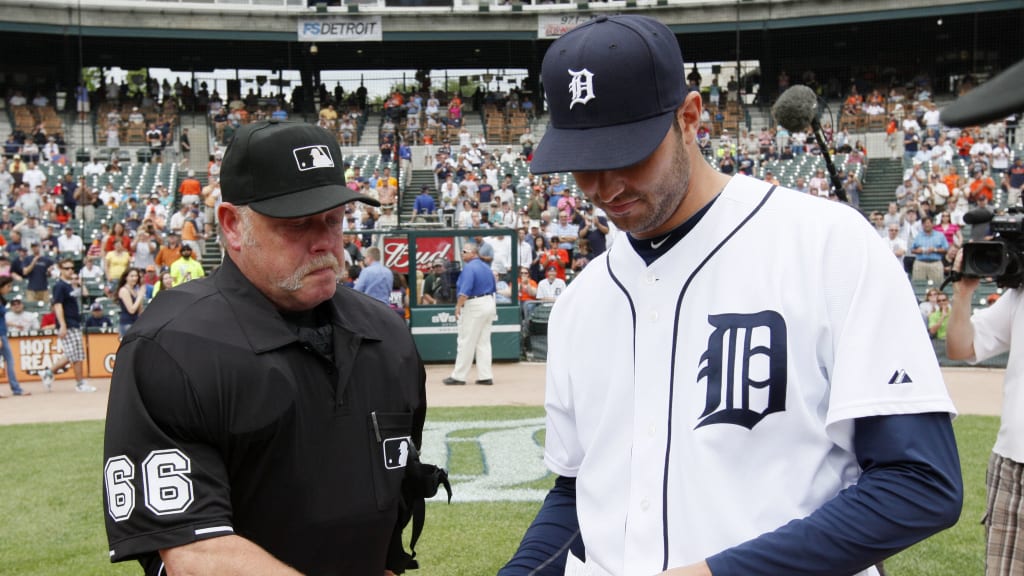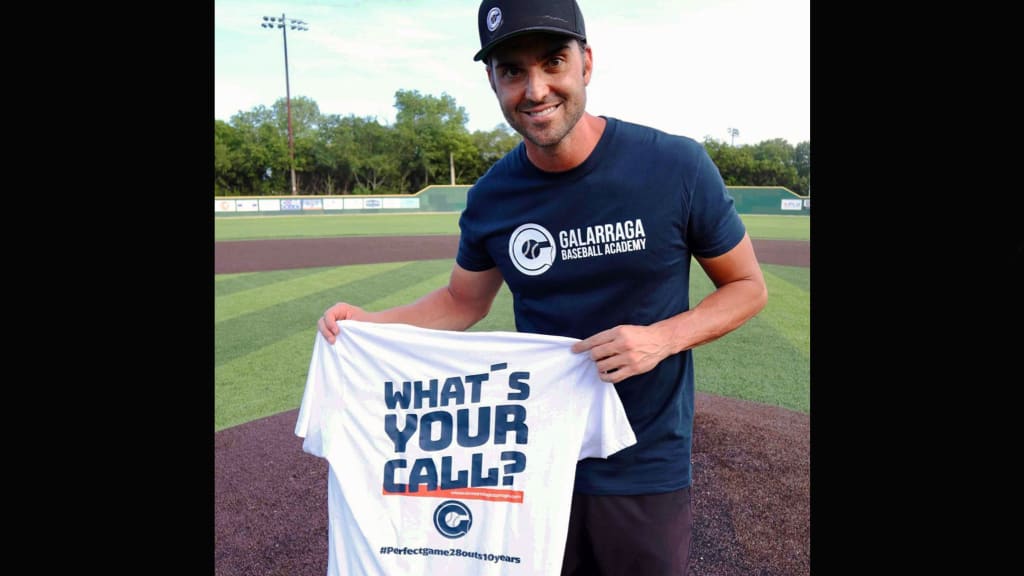DETROIT -- The car still sits in Armando Galarraga’s garage, a silver Corvette ZR1 in almost perfect condition, 10 years after Galarraga’s near-perfect game.
“I don't drive it that much,” Galarraga said Monday. “Actually my dad, I think, drives it more than me.”
When Chevrolet wanted to reward Galarraga for the sportsmanship he displayed after umpire Jim Joyce’s missed call, they drove a red Corvette onto the field for him the next day. They offered him a Corvette in any color he wanted. Galarraga had his eye on a ZR1, twice the cost of the standard model, and offered to pay the difference. It’s the one time he allowed himself to be a little selfish.
Ten years later, the car is still going. The lessons Galarraga and Joyce provided are, too. They might be more important now than when Joyce made the call that denied Galarraga his perfect game.
It’s empathy from two people on the same field from different backgrounds. Joyce, realizing his call at first base on Jason Donald’s ninth-inning ground ball was incorrect, was heartbroken that Galarraga wouldn’t get the perfect game. Galarraga, seeing a tearful Joyce after the game and again at home plate to exchange lineup cards the next day, understood his emotional devastation.

“After everything happened, I saw him at his locker,” Galarraga said. “[Then-general manager] Dave Dombrowski told me that Jim Joyce still feels really bad. I saw a guy who still feels terrible. He had his head down and said he was sorry. I put myself in his shoes.
“I was trying to think of how we can focus on the solution and not the problem. Let's not point fingers. You have to understand: Don't erase a guy's 25-year career for one mistake. We all make mistakes. I understand how professional he is. He has a lot of respect from a lot of players, all the strength that he had, all this experience. He had a lot of pressure on his shoulders. And in that position, for me everything was flowers, for him everything was negative. A lot of people said really negative stuff.
“We clicked at that point. We didn't know at that point the news was going to be so big.”
It’s why a one-hit shutout against Cleveland stands out more in history than a perfect game probably would have. It’s why everyone from Galarraga to former Tigers manager Jim Leyland have been getting calls and messages about the game for more than two weeks.
“There's been a lot of conversation about it,” Leyland said.
“I take this opportunity because it's my week to be famous,” Galarraga said. “And after that, I'm a regular guy.”
Until then, Galarraga is trying again to find some good out of the experience, this time hoping to help his native Venezuela. He’s selling T-shirts marking the anniversary with the message: “What’s Your Call?” and the hashtag #perfectgame28outs10years. The shirts, which also denote his baseball academy, are available at armandogalarraga.com/shop.

Galarraga was scheduled to be in Detroit this week along with Joyce, signing autographs and selling books with proceeds going to Venezuela. Once the pandemic scuttled those plans, he had the idea of T-shirts.
“Venezuela’s in bad shape so when the coronavirus comes, they don't have any food, they don't have any medicine,” Galarraga said. “It's already bad. People over there, they need help desperately.”
Though he raised the idea of Major League Baseball reversing Joyce’s call at first base and retroactively awarding him the perfect game in an interview last month in The Athletic, Galarraga now emphasizes that he isn’t looking for change. It was more him wondering aloud.
It isn’t the first time. Speculation over whether MLB might step in began almost immediately after the game, but it was quelled the next day.
“You can't do it,” Leyland said last week. “It's too bad it happened. But you can't change it. That just opens up a whole can of worms [with previous missed calls in history].”
It would’ve been the first perfect game in Tigers history, and the first by a Venezuelan-born Major League pitcher, an honor Félix Hernández achieved for the Mariners two years later. It also would’ve been the second-fewest pitches thrown among the 20 perfect games for which pitch counts are available; Donald’s grounder was on Galarraga’s 83rd pitch.
It also would’ve been among the least likely perfect games of all. Galarraga had tossed six perfect innings against the Royals in 2008 before giving up a base hit, but he opened the 2010 season at Triple-A Toledo. He returned to Detroit’s rotation on that June 2 night after Dontrelle Willis was traded.
Even so, a perfect game might not have stood out in time like it does to this day.
“Definitely no,” Galarraga said. “We get more attention the way we handle things. Ten years later, it seems like yesterday. It's one thing that makes the beauty when you retire: What did you contribute to baseball? And to me, I think it's a good test. I'm not a guy who played 10 years in the big leagues. I'm not a guy who made a lot of All-Star Games.”
Galarraga didn’t pitch in Detroit for much longer. He provided some more pitching gems that season, including seven scoreless innings and eight strikeouts against the Indians again in August. But his right elbow, which underwent Tommy John surgery years earlier, began bothering him again.
The Tigers traded him that winter to Arizona. After 13 starts between the D-backs and Triple-A Reno, Galarraga couldn’t pitch through the elbow issues, and underwent surgery to remove bone chips. When he came back, his velocity had dropped.
After five starts with the Astros in 2012, Triple-A stints with the Reds and Rockies in '13, Taiwan in '14 and Mexico in '15, Galarraga retired.
“I was trying to change the way I pitch, trying to get better,” he said. “But the problem is how I feel the next day. The next day, my elbow, I can't even move it.”
He has made peace with it, just as he made peace with Joyce. Galarraga has the memories. He has the car and other gifts. He has that game. And he still has a lesson to teach.
“When you communicate, when you don't point fingers,” he said. “Look for the solution, not the problem. A lot of people talk loud and talk a lot and I don't think that's the best way to be a role model. I'm coming from a country in Venezuela [where] everybody's talking, everybody's pointing fingers.
“That's the beauty of this story. The beauty is we don't say a lot. We both do our best. When I did my interviews, we backed up each other. And it’s why the story is bigger than a perfect game. I've been lucky to not be lucky.”


